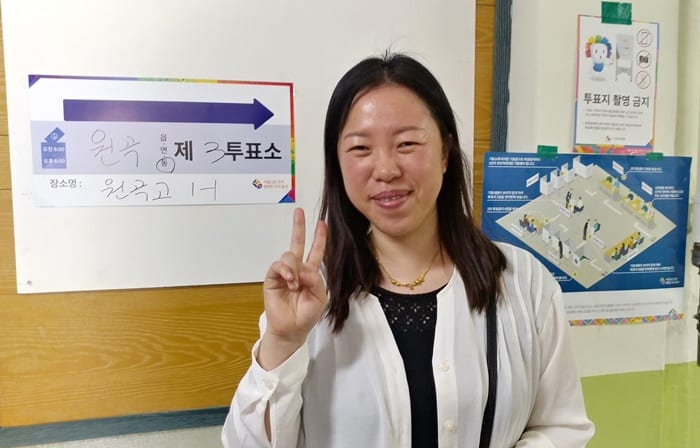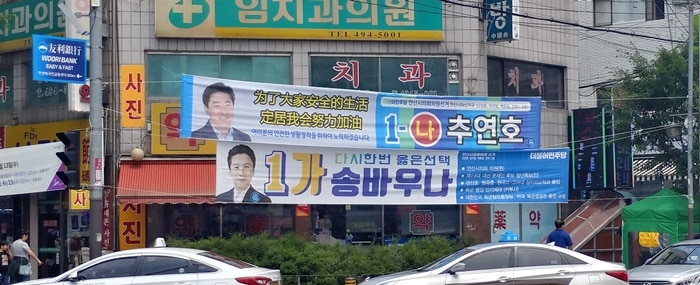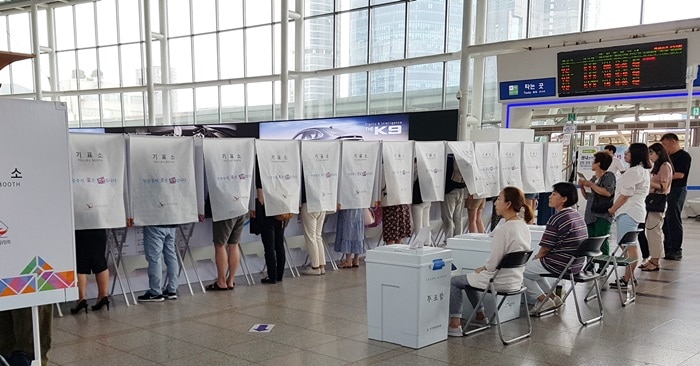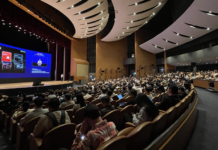
Lin Chun Li, a Korean resident with Chinese citizenship, smiles after voting in the seventh round of quadrennial local elections, at Wongok High School polling station No. 3 in Wongok-dong, Danwon-gu District, Ansan-si City in Gyeonggi-do Province on June 13.
By Lee Kyoung Mi and Hahm Hee-eun
Photos = Lee Kyoung Mi
Ansan | June 15, 2018
“I was nervous because it was my first time to ever participate in an election. I’m proud that my voice, as a non-citizen resident, will be reflected in policy.”
Lin Chun Li, from mainland China, shared her feelings after voting in the seventh round of quadrennial local elections at Wongok High School polling station no. 3 in Wongok-dong, Danwon-gu District, Ansan-si City in Gyeonggi-do Province on June 13.
This year, Gyeonggi-do Province had 30,851 non-citizen voters eligible to vote in local elections, the largest number of non-citizen residents among any province or special city in Korea. Among them, 2,650 voters gathered at the polling station in the neighborhood of Wongok-dong in Danwon-gu District, Ansan-si City, recording the largest number of non-citizen voter sat any one polling station in the country.
When asked for a few words after casting her democratic vote, Lin Chun Li, who has been living in Korea for more than 12 years, said, “Citizens are not eligible to vote in mainland China, and this was my first time voting since I moved to Korea. It was a bit confusing at first, because there were several ballots. I was also very nervous and concerned in case I made a mistake while voting. I tried my best to vote cautiously,” she said as her face beamed with civic pride.
She further said, “I hope that the person for whom I voted will eventually be elected, so that I can contribute to developing my town into a better living place.”
Another non-citizen voter, Pan Alla, who holds Uzbekistani citizenship, said, “I’m very interested in educational policy for children of multicultural families.” She said that she has been waiting for election day to vote for a specific candidate.
Pan Alla also added that, “I’m married to a Korean citizen and have been living in Korea for 15 years, but this is the first time for me to participate in voting. Previously I’ve felt somewhat isolated, since election candidates simply passed by non-citizen residents during their campaigns. Now, I’m a respectable voter who can righteously exercise my democratic right to vote.”

A Korean election campaign banner in simplified Chinese is strung up along the streets in Ansan-si City, Gyeonggi-do Province on June 13, in the run-up to Korea’s seventh round of local elections.
Yin Jing Zhu, another Korean resident with Chinese citizenship and who operates a restaurant along the Ansan Multicultural Food Street, shared his thoughts about his first voting experience. “Today, I had to close the restaurant for a while to vote. If I had known about the early voting system, I wouldn’t have had to close up shop. Still, I thought I shouldn’t give up on this chance to exercise my democratic right to vote. I have to vote, by any means.”
The early voting system, in which registered voters who cannot vote on the day of the election itself can vote in advance at any polling station without any additional paper work, was open on June 8 and 9 for this year’s local elections, which were on June 13.
According Korea’s election laws, non-citizen residents can vote in local elections if they are 19-years-old or older, are listed in the national foreigner registration database (i.e., if they are legal), and if they have spent three years living in Korea after having been granted permanent residency, which comes with a legal visa. Non-citizens were given the right to vote in such local elections for the first time in 2005, and they were able to exercise that right in the country’s fourth local elections, held in 2006. Korea is the only country in East Asia that grants non-citizen residents the right to vote in local elections.
In some cases, non-citizens can participate in all elections, including elections for the president and the National Assembly, but this is only after those non-citizens go through a naturalization process and become actual Korean citizens, so technically they wouldn’t be non-citizens anymore. They’re citizens now.
Kaan Zubair, who visited his local polling station wearing traditional Arab clothes, has lived in Korea for 25 years, and it has been 15 years since he has become a Korean citizen. He said that he has voted in four Korean presidential elections, and added that, “This time, I have selected a candidate that will secure our country. Public order and security is not preserved very well in Pakistan, especially during the election cycle. I’m glad that I can openly and safely share my political opinions in Korea.”
Kaan, who is able to speak fluent Korean, said, “As for improvements, I’d say it would be better if there were more information offered in English. In the official gazettes for the elections, only basic explanations are written in English. There are lots of non-Koreans who live here who find it difficult to read or understand Korean, even if they have little difficulty to speak Korean.”
It has been 10 years since non-citizen residents have had the right to vote in local elections, and naturalized Koreans can vote in all elections. Certainly some improvements are needed, but it can be seen as a desirable attempt in this era of globalization to expand the democratic franchise to all members of the community. This is an example that should be thoroughly examined in order to protect the most fundamental rights that people have in democratic nations: the right to vote, in privacy and in safety, without undue pressure or coercion, for the candidate of their choosing and, in the end, to choose one’s own government.

Citizens gather at polling stations to vote in Korea’s seventh round of local elections, at Seoul Station during the early voting period on June 9.
km137426@korea.kr























